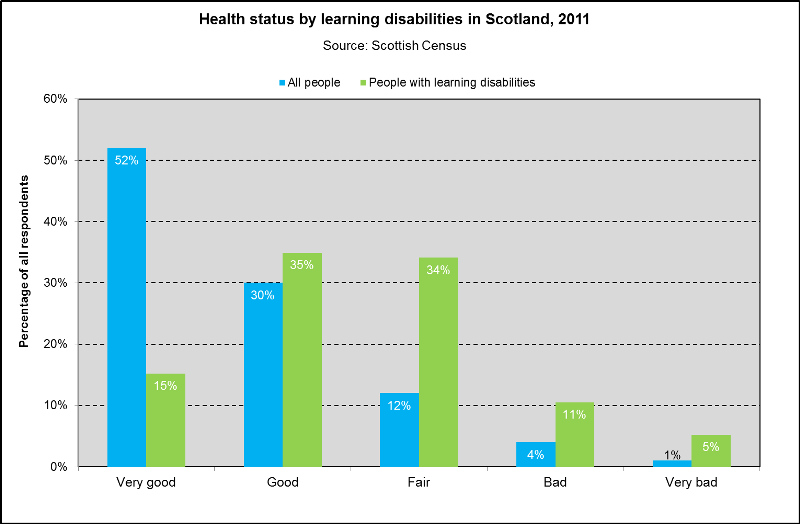Learning disabilities
People have learning disabilities from birth or develop them during infancy or childhood. The Scottish Government describe people with learning disabilities as those who have a significant, lifelong, condition that started before adulthood, which affected their development and which means they need help to understand information, learn skills and cope independently.
Prevalence
Prevalence of people with a learning disability in selected Scottish cities, 2022
 This is the second highest proportion among the selected Scottish cities, with only Dundee being higher at 6.3%. The average estimate for Scotland as a whole is 5.2%.
This is the second highest proportion among the selected Scottish cities, with only Dundee being higher at 6.3%. The average estimate for Scotland as a whole is 5.2%.
Inequalities
People with learning disabilities experience significant inequalities across multiple domains of life. The Confidential Inquiry into the Premature Deaths of People with Learning Disabilities (2013)[1] found that people with learning disabilities die much earlier than people in the general population and that many of these deaths were preventable.
Research shows that people with learning disabilities experience multiple co-existing health conditions at rates significantly higher than those in the general population[2].
Health status by learning disabilities in Scotland
The health inequalities experienced by people with learning disabilities can be seen in Scotland’s 2011 Census data, as shown in the chart below (please note that health status by learning disability has not been published from the 2022 Census). For example, when asked about their health, only 15% of people with learning disabilities rated their health as very good, compared with 52% of all people. On the other hand, 16% of people with learning disabilities rated their health as either bad or very bad compared to only 5% of the general population. Furthermore, 25% of people with learning disabilities had three or more disabling long-term conditions, aside from learning disabilities, compared with only 2% of all people.

Tackling inequality
Action to address inequalities experienced by people with learning disabilities must be informed by robust evidence about the specific dynamics and manifestations of these inequalities in this population. However, there are significant gaps in the evidence[3] needed to underpin effective action to address such inequalities. We need much more detailed knowledge of the ways in which having learning disabilities can affect individuals’ opportunities to live healthy and fulfilled lives.
To achieve this, the Scottish Learning Disabilities Observatory has developed a flexible programme of work that aims to contribute to a better understanding of the multiple factors that can influence the health of people with learning disabilities and people with autism.
To support the development of more effective policies and plans across Scotland the Scottish Learning Disabilities Observatory has developed an interactive website that provides information about the population of people with learning disabilities and people with autism nationally and locally. Data are currently presented by health board and local authority and are drawn from Scotland’s Census 2011.
References
[1] Heslop P, Blair P, Fleming P et al (2013) Confidential Inquiry into the Premature Deaths of People with Learning Disabilities: Final Report. www.bris.ac.uk/cipold [Last accessed January 12th 2016]
[2] Cooper, S-A., McLean, G., Guthrie, B., McConnachie, A., Mercer, S., Sullivan, F., and Morrison, J., (2015). Multiple physical and mental health comorbidity in adults with intellectual disabilities: population-based cross-sectional analysis. BMC family Practice, 16, 110
[3] Robertson, J., Hatton, C., Baines, S. & Emerson, E. (2015). Systematic Reviews of the Health or Health care of People with Intellectual Disabilities: A Systematic Review to Identify Gaps in the Evidence Base. Journal of Applied Research in Intellectual Disabilities, 28, 455-523.
Notes
The Scottish Learning Disabilities Observatory was set up in 2015, with funding from the Scottish Government, to contribute to health improvement by providing information, data, and intelligence on the health and healthcare of people with learning disabilities and people with autism. Follow the link to the SLDO website for more detailed information on learning disabilities.
The Scottish learning disabilities strategy, The keys to life (2013) emphasises the need to address the major health inequalities experienced by people with learning disabilities in Scotland.
This page was last updated in April 2025.
